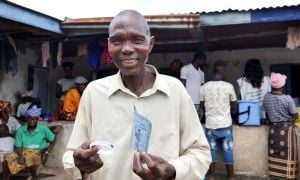
Read our 2023 annual report

Knowledge Hub
Support to the National Safe Blood Service in Sierra Leone
€50,000 of funds received by Concern from the Irish public, provided an immediate essential short-term solution to the blood shortage crisis in Sierra Leone potentially saving over 17,000 paediatric patients, or over 5,000 women’s lives.
In Sierra Leone 46% of the estimated 443 annual maternal deaths in the country are due to obstetric hemorrhaging (RMNCAH-N, Ministry of Health and Sanitation [MoHS] 2023). This is 19% higher than the global average. If a woman is bleeding because of childbirth, nursing and midwifery staff can perform all clinical interventions to stop the bleeding but without replacement blood the woman will ultimately die.
In addition to supporting women with complications during childbirth, safe blood services are essential in emergency services, surgery, and the treatment of anaemia, sickle cell disease and malaria which continue to be among the most common underlying causes of death in children in Sierra Leone (Child Survival Action Plan, MoHS 2023).
Every unit of blood donated can save up to 3 lives.
Concern has been working with the Ministry of Health and the National Safe Blood Service (NSBS) for the last 3 years to improve planning, procedures, and availability of services.
On 6 December 2023, a core partner meeting was called by the Ministry of Health in Sierra Leone to request urgent support to address a critical shortage of the essential items required for safe blood donation and transfusion.
The stock-out of these lifesaving supplies was nationwide and included the district and regional blood banks leaving a critical gap in the delivery of emergency health services. On a normal day Sierra Leone is only able to provide around 15% of the blood needed for health service delivery, however due to the supplies crisis this was reduced to 0%. The causes of the stock out were complex and included disruption to shipping routes, short-dated commodities, low government health funding and reduced / inconsistent donor funded programs.
Following the urgent needs expressed in this meeting, Concern mobilized funds received from the Irish public to provide an immediate essential short-term solution to the emergency with €50,000, immediately procuring and delivering a 2-month supply of blood donation and transfusion materials, potentially saving the lives of over 17,000 children or more than 5,000 women.
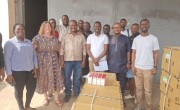
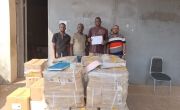
Using local suppliers already approved by the Ministry of Health, Concern procured:
- 5,800 blood bags in 2 sizes for use in maternal and child emergencies.
- Hepatitis and Syphilis screening kits to ensure the safety of donated blood.
- Blood grouping supplies to ensure that blood is transfused based on individual compatibility.
- Coombs testing kits to reduce the likelihood of transfusion complications.
Distribution of procured supplies:
Concern formally handed over all supplies on the 22nd and 27th of December 2023 at the Central Medical Stores. As a reflection of their commitment to taking ownership and responsibility for transfusion services, the Ministry of Health committed to distribute all supplies nationwide before the end of 2023 informed by specific hospital needs.
Future support:
The Concern team will continue to support the NSBS as a technical partner in close collaboration with others as we continue to improve the resilience and quality of the health system. This includes planned community and facility-based support to blood donation under the new Saving Lives in Sierra Leone 3 programme.
However, despite our efforts, a longer-term investment is essential to ensure a sustainable service is built.
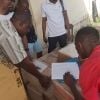
I am short of words, these supplies arrived when we were completely out of stock and our services were incapacitated, we had completely lost capacity to provide blood services. I want to say thank you on behalf of the people of Kambia.
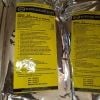
You do not realise how far this donation will go; some facilities had already started to report maternal deaths due to a lack of these supplies...on behalf of the Ministry of Health and the National Safe Blood Service I want to say thank you, thank you, thank you!


